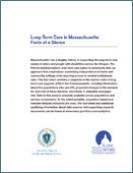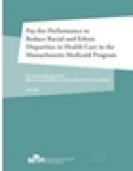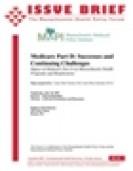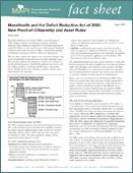Long-Term Care in Massachusetts: Facts at a Glance

This issue brief updates "MassHealth and State Fiscal Health: A New Look at the Effects of Medicaid Spending on State Finances," through 2007.


A fact sheet that introduces MassHealth, the Massachusetts Medicaid program, describing its basic structure, benefits and beneficiaries. It examines how enrollment and spending have changed over time and describes some current policy issues and challenges.


An easy-to-use guide describing public health insurance options in Massachusetts and a set of flow charts illustrating the eligibility pathways to these programs for low-income people and families, elderly people, and people with disabilities. Also available on the Pathways to Coverage website.


The district court ruling in Rosie D. v. Romney, and the subsequent remedy now being implemented by state health and human service agencies, have the potential to transform the delivery of mental health services for children with serious emotional disturbances in Massachusetts. This issue brief explores the implications and potential effects of the case and the resulting remedy on the MassHealth program, other state programs, the behavioral health and social service delivery systems, and affected children and their families.


The 2006 Massachusetts health care reform law included a provision to make Medicaid hospital rate increases contingent upon quality measures, including measures of the reduction of racial and ethnic disparities. To date, no other pay-for-performance programs have incorporated measures of the reduction of racial and ethnic disparities into their incentives. MMPI organized the Massachusetts Medicaid Disparities Policy Roundtable to bring together a group of experts to develop and recommend an approach to implementing the program.


The creation and implementation of the Medicare prescription drug benefit -- "Part D" -- attracted wide national attention and controversy. This paper, produced in collaboration with the Massachusetts Health Policy Forum, looks beyond the anecdotes and gives a progress report on the impact of Part D in Massachusetts for Medicare beneficiaries -- 200,000 of whom are also MassHealth members and for state health programs such as MassHealth and Prescription Advantage.


The issue brief examines how SCHIP is part of the Commonwealth's universal coverage strategy; how SCHIP is funded in Massachusetts; and the funding shortfalls the program now faces. The brief also details how the SCHIP program and funding are integrated with MassHealth, and the implications of that connection for the upcoming negotiations to extend the MassHealth waiver.


This report examines some of the important issues, opportunities and challenges facing the MassHealth program at the outset of a new Governor's administration including renewal of the the MassHealth waiver, improving the value of MassHealth purchasing, rebalancing long-term care, and providing strong leadership and bolstering staff.


This issue brief looks at the terms and conditions of the MassHealth Waiver, approved in July 2006, that will run through FY 2008. The July 2006 Waiver approval incorporates the provisions of the health reform law, which enacted some of the changes required in the initial approval of this Waiver renewal, in January 2005. MMPI produced an analysis of the initial approval last year; this brief updates the earlier one to reflect the terms of the Waiver as they now stand.


The federal Deficit Reduction Act enacted provisions designed to reduce federal Medicaid spending by nearly $5 billion over the next five years. This fact sheet examines two of these provisions in detail and discusses their implications for MassHealth members, administrators and providers.


This report from MMPI and the Massachusetts Budget and Policy Center looks at Medicaid spending in relation not only to total public spending, but also to state revenues and overall economic growth. It concludes that, between Fiscal Years 1994 and 2005, Medicaid spending changed very little in relation to the economy as a whole, and therefore was sustainable given the economic growth over that same period. Looking at Medicaid spending with this broader view provides a new context for policy makers as they think about the Medicaid budget, now and in the future.


This issue brief reviews the concept of budget neutrality and, within its constraints, the options available to maximize federal dollars for coverage of the uninsured.


This report provides new perspectives about the importance of MassHealth for the state's business community and, in particular, explains how a strong MassHealth program benefits employers. MassHealth is a major source of health insurance for low-wage workers, covering more than 400,000 employed people and their families. It is a major reason why Massachusetts has a relatively low percentage of people without insurance, and program expansions have helped reduce the costs of uncompensated care, which is financed in part by the business community.


In 2005, Massachusetts renegotiated with the federal government major provisions of the State’s Medicaid program governed by the MassHealth Waiver, which has been in effect since 1997. The new terms of the Waiver, which became effective July 1, 2005, are significantly different from the current terms, particularly in the details of how the program is financed. This issue brief describes the most significant changes in the Waiver agreement and identifies the major issues involved with state implementation.

